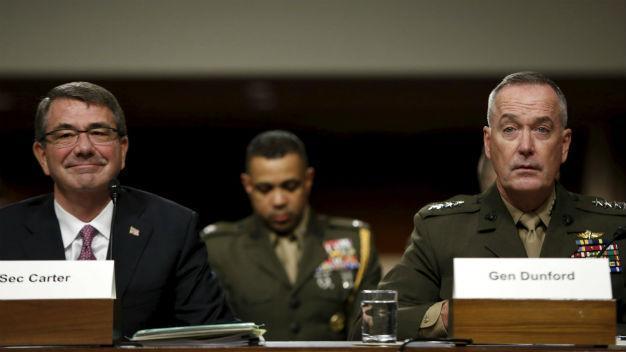Pentagon chief praises Kurdish fighters in Syria
WASHINGTON – Agence France-Presse

REUTERS photo
U.S. Defense Secretary Ashton Carter on March 17 praised the fighting of Kurdish groups in Syria that have declared a federal region in areas of the country under their control.The Kurds “have proven to be excellent partners of ours on the ground in fighting ISIL [the Islamic State of Iraq and the Levant],” Carter said in testimony before the Senate Armed Services Committee.
“We are grateful for that, and we intend to continue to do that, recognizing the complexities of their regional role.”
He spoke the same day Syria’s Kurds declared a de facto federal region in areas under their control in the north of the conflict-riven country, a move the United States opposes.
The three Kurdish-controlled regions agreed at a conference in Rmeilan in northeast Syria to establish the self-administered “federal democratic system of Rojava - Northern Syria,” officials announced. Rojava is the Kurdish name for north Syria.
Officials said at a news conference they intended to begin preparations for a federal system, including electing a joint leadership and a 31-member organizing committee which would prepare a “legal and political vision” for the system within six months.
A document seen by Reuters, issued at the meeting, said the aim was to “establish democratic self-administered regions which run and organize themselves ... in the fields of economy, society, security, healthcare, education, defense and culture.”
State Department not supportive of federal system
The U.S. State Department said it did not recognize self-governed zones inside the war-torn country and was working for a unified, nonsectarian state under different leadership.
“We don’t support self-ruled, semi-autonomous zones inside Syria. We just don’t,” said State Department spokesman John Kirby on March 17.
“What we want to see is a unified, whole Syria that has in place a government that is not led by [President] Bashar al-Assad that is responsive to the Syrian people. Whole, unified, nonsectarian Syria, that’s the goal,” Kirby said, adding that other countries supported that aim as well.
Kurdish groups say declaring a federal region along Syria’s northern border with Turkey is aimed only at formalizing a semiautonomous zone they have already established during five years of war and create a model for decentralized government across Syria.
But Washington believes any Syrian federalism should develop from United Nations-sponsored talks over a political settlement of the conflict currently underway in Geneva.
However, none of the groups representing the Kurdish minority are participating in the talks because of opposition from Turkey.
The Syrian government and the main Arab-led opposition group oppose federalism in Syria.
So does Turkey, which fears Kurds’ ambitions in Syria are fuelling its Kurdish citizens at home.
Kurds have played a crucial role in the U.S.-led fight against ISIL in Syria, providing the backbone of the forces that have pushed back the jihadist group in the country’s northeast.
The Kurds play a dominant role in the Syrian Democratic Forces (SDS), an Arab-Syrian coalition the United States supports.
However, the Pentagon believes more Arab fighters will join the group.
“One month ago I would have said there are about 2,500 Arabs inside Syrian Democratic Forces,” said Joint Chiefs of Staff chairman Gen. Joe Dunford, who spoke alongside Carter. “Today, I can tell you we have 5,000.”
More coalition victories would have a “snowball effect,” he added.
“More people now are willing to join us because they see the level of support that we are providing and more importantly the level of success that these forces are having.”
SDS fighters aided by U.S. special forces recently took control of Al-Shadadi, a town in northeastern Syria previously considered a strategic ISIL stronghold.
The SDS has a total of 10,000 to 15,000 fighters, Dunford said, adding that they have an estimated reserve of 20,000 to 30,000 men.
















